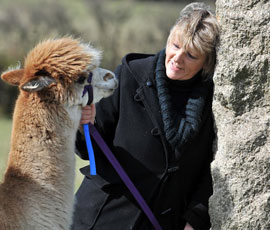Farmer tells story of how she caught TB

A livestock owner who started a website to raise awareness of bovine tuberculosis in alpacas is seriously ill with the disease herself.
Dianne Summers was diagnosed with human TB caused by Mycobacterium bovis last week, after doctors initially thought she was suffering from pneumonia.
Ms Summers, of Redruth, Cornwall, founded the Camelid TB Support & Research Group after losing one of her own alpacas to the disease almost four years ago. The group and its website have since become an important source of information about bovine TB for camelid owners across the country.
She fell ill in February, presenting symptoms of a severe common cold. Doctors suspected she was suffering from pneumonia, but tests later confirmed her worst fears that she had contracted TB.
“I thought this was all behind me, but this has just ruined me again,” she said. “My consultant told me humans can harbour the disease for years before it presents itself.”
Ms Summers is bedridden and doctors have prescribed her a cocktail of drugs, including ethambutol, risampicin, isoniazid and pyridozine, and taking them has led to some serious side effects. They have told her recovery will take nine months.
She has stopped working while she recovers and is living in self-imposed isolation. Friends are looking after her herd of 20 alpacas and three sheep.
Ms Summers lost her first alpaca to bovine TB in 2008. Seven further losses were confirmed in November 2009. However, she said her herd of alpacas was currently TB free.
She is a member of the British Alpaca Society and in her role she advises other camelid owners about how to deal with the disease in the animals.
Ms Summers has visited dozens of herds around the country and given advice about how to deal with the problem. She is still waiting to find out if her disease is linked to her own herd or others she has been involved with.
Ms Summers started AlpacaTB.com to highlight the risk posed by bovine TB to camelids, such as alpacas and llamas, and provide advice to their owners.
More usually associated with badgers and cattle, bovine TB has also affected 56 alpaca and llama herds in England and Wales as of 1 March 2012.
But she believes bovine TB in camelids is more common in the UK than reports suggest and accused the British Alpaca Society of “sweeping the problem under the carpet”.
“There have now been 59 herds affected, which is a lot. But I believe there are many more holes being dug in fields across the UK,” she added.
Ms Summers urged alpaca and llama owners who suspect TB in their herds to act responsibly and report any suspected cases.
“Alpacas can be absolutely riddled with lesions, but still be able to walk around perfectly well,” she said.
“If you are suffering losses in your herd, make sure you have a post-mortem examination.
“Alpaca farmers need to know if they have got bovine TB in their herd, not only for the risk to their animals, but also themselves and their family.”
The Health Protection Agency said there were 35 cases of human TB caused by mycobacterium bovis in the UK in 2009, 29 in 2008 and 28 in 2007.
But an agency spokesperson said the risk of people contracting TB from livestock, including alpacas, was “very low”.
“Human TB caused by Mycobacterium bovis counts for less than 1% of the total TB cases in the UK. It’s a really tiny percentage,” said the spokesperson.
The British Alpaca Society said a blood test has recently been developed which can detect bovine TB in infected camelids. But the test is still awaiting full approval from authorities.
A spokesperson for the society said: “Human TB caused by Mycobacterium bovis used to be a huge problem caused mainly by people drinking unpasteurised milk. But cases are now very rare, and as far as we know, Dianne’s is the first case in a person with camelids.
“Dianne has done a tremendous amount of work for us, helping farmers whose herds have been infected with TB. “We are already doing a lot to raise awareness of the disease among camelid owners. But I suspect Dianne would like us to be shouting about it more widely. We wish her a speedy recovery.”
DEFRA said there were currently no statutory movement restrictions for camelids.
“Our statistics show that camelids are not a major reservoir of bovine TB and are not a major cause of it spreading,” said a spokesman.
“With alpacas and other non-bovine animals, we work with the owners of camelids on testing and put in measures to stop the spread of the disease. We also work with owners to cull any infected animals and compensate them for their losses.”
However, DEFRA is currently reviewing its measures concerning non-bovine animals that contract TB and assessing whether changes to legislation are necessary.
For more on this topic
See our special badger cull pages
Join the conversation on our badger cull forum
